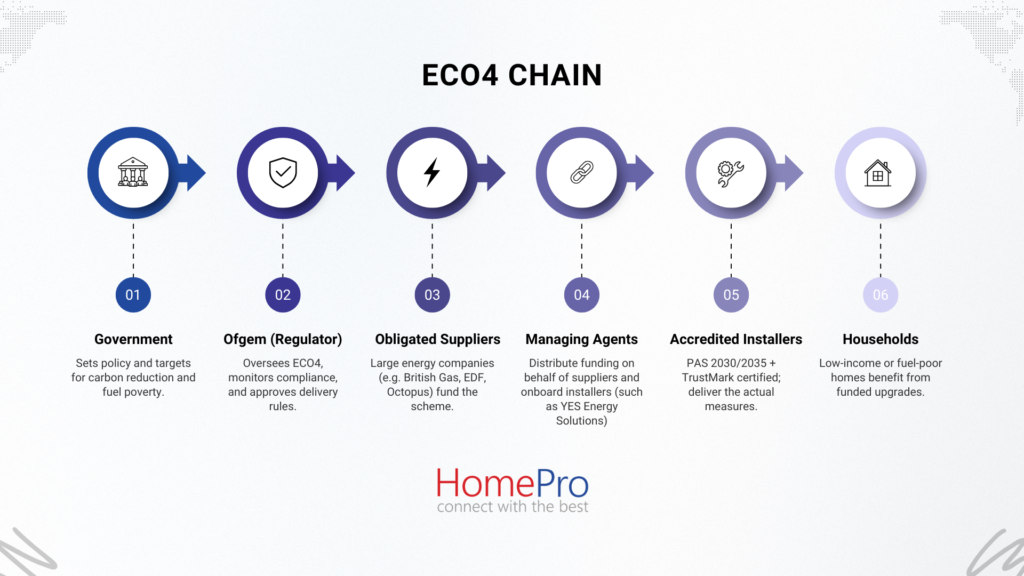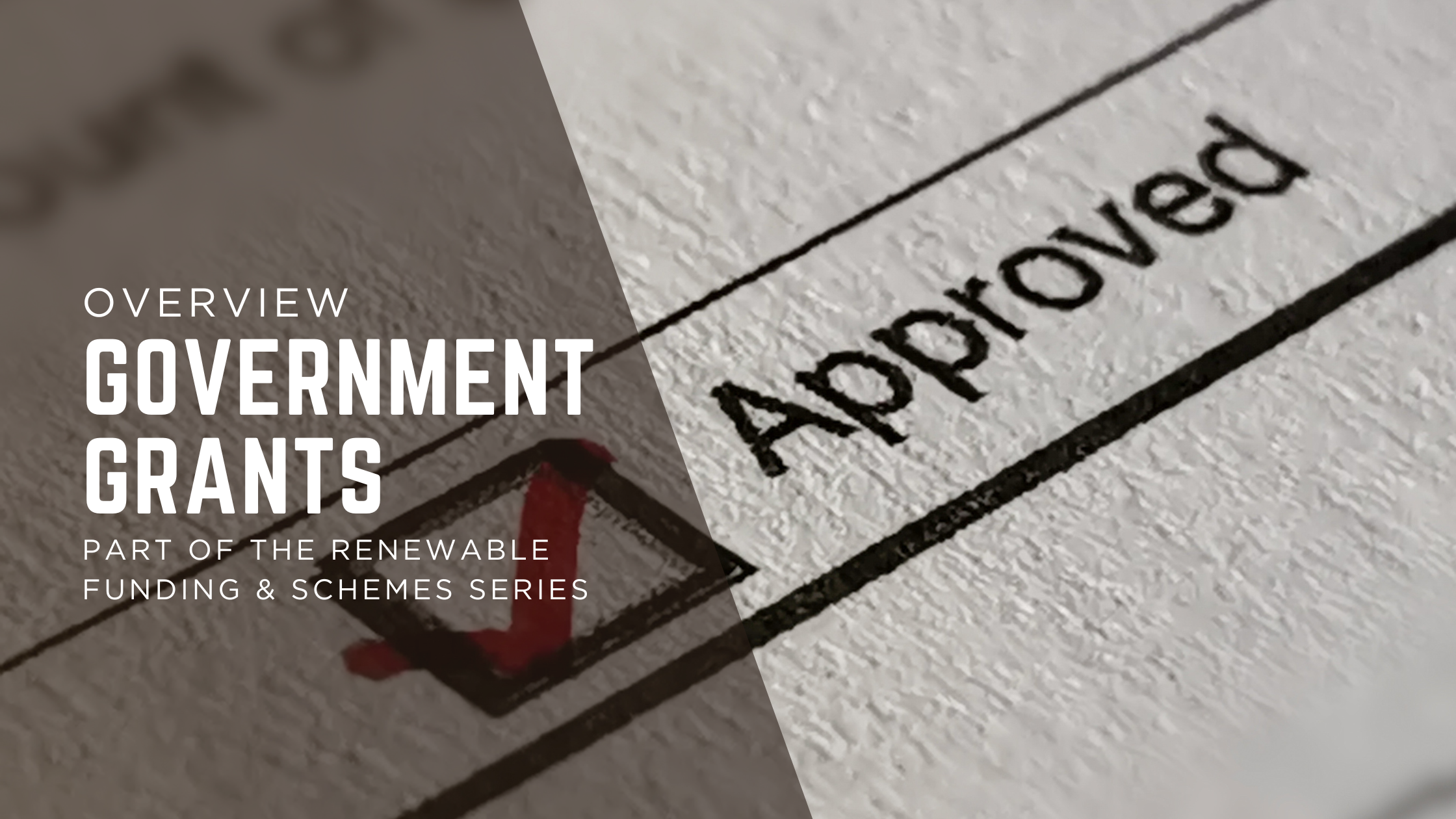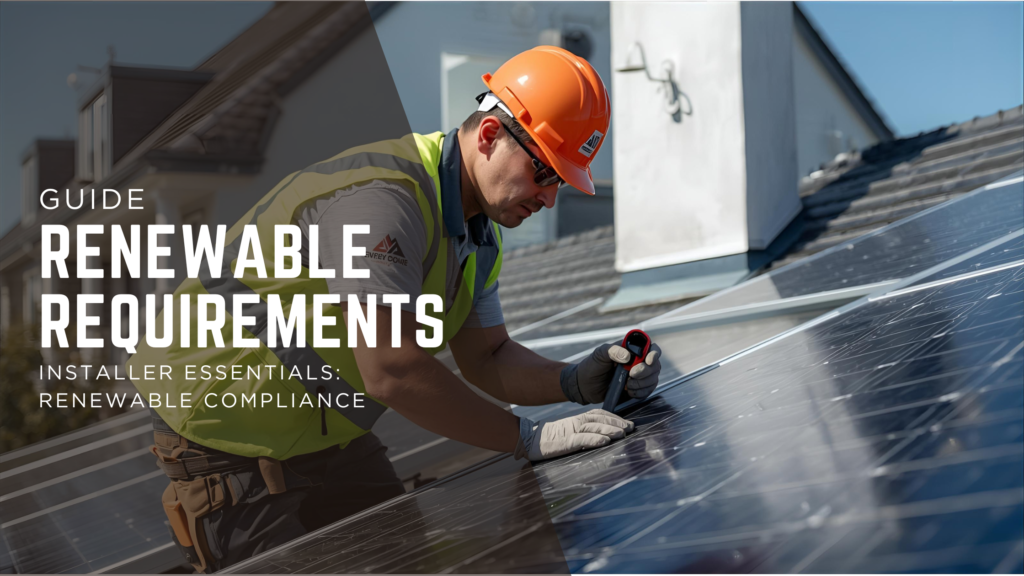Grants and government funding schemes are one of the biggest drivers of renewable jobs in the UK. This guide covers the main UK renewable grants available to homeowners and installers
They lower the upfront cost for homeowners, create steady demand for accredited trades, and ensure that only certified installers can deliver funded measures.
Whether you’re fitting heat pumps, insulation, or solar panels, knowing which schemes are live — and how to access them — is essential.
This guide pulls all the current opportunities together in one place, so you don’t have to hunt through multiple sources.
This article was prepared in September 2025 and is correct at the time of writing. Schemes can change—always check the official guidance and application pages linked in each section before advising customers or applying.
For protection on all renewable jobs, explore our guide to Insurance Backed Guarantees in Renewables
Boiler Upgrade Scheme (BUS) – England & Wales
What it is
This scheme offers upfront grants to help homeowners replace fossil-fuel heating with an air-source or ground-source heat pump. In limited cases, biomass boilers are also eligible.
Grant value
The grant provides up to £7,500 per property. Installers claim the funding directly on behalf of the homeowner, so customers don’t have to manage the paperwork themselves.
Installer requirements
MCS-certified for the technology installed.
- Consumer Code (RECC or HIES)
- Certification Body (British Assessment Bureau, APHC Certification Ltd, NICEIC, HETAS, NAPIT Certification Ltd, Oftec, Simply Certification, The IAA
TrustMark registered (scheme delivery requires TrustMark oversight)
Entry point
ECO4 – Great Britain
What it is
ECO4 is the fourth phase of the Energy Company Obligation and is one of the largest UK government-backed funding schemes for domestic energy efficiency improvements. It is currently scheduled to run until March 2026 and focuses on whole-house retrofits for low-income and fuel-poor households.
Typical measures delivered under ECO4 include:
- Insulation: loft, cavity, and solid wall.
- Heating upgrades.
- Renewable measures, in limited cases, delivered as part of a wider retrofit, often accessed via ECO-flex, where local authorities apply additional eligibility criteria.
Delivery model
ECO4 is funded by the UK’s “obligated energy suppliers” — the largest energy companies, such as British Gas, EDF, E.ON Next, Octopus, OVO, and Scottish Power.
The government requires these suppliers to spend a set amount of money on improving the homes of eligible customers. The suppliers don’t usually carry out the work themselves. Instead, they allocate funding to managing agents, framework providers, or installer networks, who deliver work where funding and delivery capacity are available.
So the chain looks like this:

For you as an installer, this means you won’t normally apply to Ofgem directly. Instead, access to ECO4 work is typically through:
Aggregator companies or managing agents that have funding contracts with the suppliers.
Local authorities through ECO-flex routes, which allow councils to refer households outside the strict benefit criteria.
Installer requirements
To carry out ECO4 work, you must have:
PAS 2030/2035 accreditation for the measures you install
TrustMark registration
The ability to evidence eligibility, technical standards, and notification requirements per Ofgem guidance
Without these accreditations, installers are generally unable to access ECO4 delivery frameworks or deliver funded work directly.
Entry points
Review Ofgem’s ECO4 Delivery Guidance and measures tables (eligibility, scoring, audit rules).
Use Ofgem’s Installers & Industry page for further information, forms, evidence tables, and scheme updates.
If you’re looking at ECO-flex opportunities, contact your local authority’s ECO team to understand their current referral routes and installer requirements, which can vary by council.
Great British Insulation Scheme (GBIS) – Great Britain
What it is
The Great British Insulation Scheme (GBIS) is a government scheme under ECO4 (via the ECO4A Order) focused on delivering insulation to homes that are less efficient. It’s designed to get measures done quickly in many households, especially those in lower Council Tax bands or with worse EPC ratings. Measures include things like loft, cavity wall, solid wall, under-floor insulation, pitched or flat roof insulation. The scheme runs until around April 2026.
Delivery Model
GBIS is funded in the same way as ECO4 — by the UK’s obligated energy suppliers (British Gas, EDF, E.ON Next, Octopus, OVO, Scottish Power, etc.).
Suppliers release funding to managing agents and installer networks, who coordinate the actual delivery.
Local Authorities can also refer households through GBIS Flex, allowing broader eligibility beyond strict benefit rules.
For installers, this means you don’t apply directly to Ofgem. You either:
Work with managing agents/aggregators (like Anesco, YES Energy Solutions, AgilityEco, Effective Energy, City Energy).
Or engage with your local authority’s energy team under GBIS Flex.
Installer Requirements
To take part, installers (and their partner suppliers) must:
Be PAS 2030/2035 certified where relevant. GBIS delivery guidance says measures must meet these retrofit / fabric standards.
Be TrustMark registered. This is part of quality/consumer protection.
- MCS Accreditation but only in rare instances where renewable measures are allowed
Be willing to follow Ofgem’s GBIS Delivery Guidance v2.0 (which sets out detailed measure eligibility, scoring, how to notify measures, monitoring, audits etc.)
Entry Points
If you’re an installer coming in cold, here are the first steps:
- Download and study Ofgem GBIS Delivery Guidance & Measures Table.
- Visit Ofgem’s Contacts, Guidance & Resources page for GBIS — it has everything: forms, supplier lists, guidance docs, audit info.
- Look into “GBIS Flex / Local Authority Flex” routes. Local authorities can refer households under flex routes for broader eligibility.
- If you don’t already, secure TrustMark and PAS accreditation (if you plan to deliver multiple measure types).
Nest/Warm Homes Nest - Wales
What it is
The Warm Homes Nest scheme is a Welsh Government programme (launched in 2011) that helps low-income households in Wales make their homes more energy efficient. Measures include insulation, heating upgrades (boiler replacement, sometimes heat pumps), solar panels, and other energy-saving improvements.
The scheme provides free advice (e.g. tariff and benefit checks, general guidance) and free or heavily subsidised home improvements for eligible households.
Delivery Model
The Nest scheme is funded by the Welsh Government as part of its commitment to tackling fuel poverty and reducing carbon emissions. Delivery is managed on the government’s behalf by a contracted managing agent, who oversees assessments, installer appointments, and quality checks.
Homeowners (or tenants) apply directly to the Nest service, where they first receive a free energy advice consultation. If they meet the eligibility criteria, Nest arranges for accredited installers to carry out the work, with costs fully covered by the scheme.
Installer Requirements
For installers to work with Nest, here’s what they usually need:
Approved or appointed contractors/frameworks: Installers generally are not directly managed by Nest but join via appointed contractors or partner organisations. Nest has used British Gas as its managing delivery partner; it also works via Energy Saving Trust as a sub-contractor in some cases.
Certifications may be required: Installers may need relevant industry accreditations (TrustMark, PAS retrofit standards, or equivalent), depending on the type of works (e.g. insulation, heating). The exact scheme specs may list required qualifications. It’s worth confirming via Nest or its managing partner.
Compliance and evidence: Work must meet quality standards, follow assessment & evidence requirements (pre-install surveys, post-install evidence, etc.), and provider expectations for safety, performance, and customer satisfaction.
Entry Points
If you are an installer interested in delivering work under the Nest scheme, here are the practical steps:
Find out who the current delivery partner/contractor is in your region. For many areas in Wales, British Gas acts as the primary delivery partner.
Look for framework or contractor opportunities published by Nest or its delivery partner. These may be tenders, contractor lists, or agreements to deliver certain measure types (insulation, heating, etc.).
Check Nest’s eligibility, guidance & installer guidelines via the Welsh Government Nest pages (Warm Homes Nest) to see what measures are covered, technical/performance standards, and whether your certifications align.
Reach out to Nest / British Gas (the managing agent) or partner organisations to express interest — sometimes installers need to apply or be approved to carry out works under the scheme.
Warmer Homes/Home Energy - Scotland
What is it?
Home Energy Scotland (HES) is the Scottish Government’s programme for helping households cut energy costs and carbon emissions. It provides free advice, grants, and interest-free loans to support a wide range of home improvements.
Typical measures include:
Insulation – loft, cavity wall, solid wall, underfloor, and room-in-roof insulation.
Heating upgrades – energy-efficient boilers, heating controls, and heat pumps.
Renewables – solar PV, solar thermal, biomass, and in some cases, hydro systems.
Other improvements – battery storage, draught-proofing, glazing upgrades, and support for connecting to heat networks.
Support is available to homeowners and tenants across Scotland, with eligibility and funding levels depending on household income, property type, and the measures being installed. The scheme is designed to make homes warmer, greener, and cheaper to run.
Delivery model
The scheme is funded by the Scottish Government and delivered through regional advice centres managed by the Energy Saving Trust.
When a homeowner contacts HES, they receive a free, impartial assessment of their home and circumstances. Advisors recommend improvements and identify relevant grants or loans. Installation work is then carried out by approved installers who meet scheme requirements for certification and quality.
Installer requirements
Requirements differ depending on the type of measure:
Energy efficiency measures (insulation)
For solid wall, underfloor, flat roof or room-in-roof insulation, installers must be TrustMark-registered.
For other insulation measures, TrustMark is recommended but not always mandatory.
Clean heating & renewable systems
Installers and products must be MCS-certified for the relevant technology (e.g. heat pumps, solar PV, biomass).
Micro-hydro is assessed case by case, with installers usually accredited by the Renewable Energy Consumer Code (RECC) or recommended by the British Hydro Association.
Heat network connections
The installer must be approved by the scheme owner/operator.
Entry points
Homeowners and tenants access support by contacting Home Energy Scotland directly via homeenergyscotland.org or the HES advice line. Advisors guide them through eligibility checks, funding applications, and connecting with certified installers.
To take part in the scheme, installers must:
Hold the required certifications (TrustMark, MCS, or other recognised accreditations depending on the measure).
Be listed on the relevant directories, such as the TrustMark register or the Energy Saving Trust’s Renewables Installer Finder (which pulls data from the MCS database and includes customer reviews).
This means the entry point for installers is certification and registration on these recognised platforms, which then allows them to be visible to homeowners applying through HES.
Affordable Warmth - Northern Ireland
What is it?
The Affordable Warmth Scheme is the main energy efficiency programme in Northern Ireland, aimed at reducing fuel poverty and improving energy efficiency for low-income households. It is targeted at owner-occupiers and private tenants with a total annual income of £23,000 or less.
The scheme covers a range of measures to make homes warmer and cheaper to heat, including:
Insulation – loft, cavity wall, solid wall, and hot water cylinder insulation.
Heating systems – replacement of inefficient or broken boilers, conversion to gas or oil central heating, and heating controls.
Renewables – in some cases, biomass heating systems or renewable heating upgrades, where appropriate.
Other improvements – draught-proofing and ventilation works, smoke/CO alarms, and other safety-related upgrades.
Delivery model
The scheme is funded by the Department for Communities (DfC) and delivered in partnership with the Northern Ireland Housing Executive (NIHE) and local councils.
Local councils identify eligible households and refer them into the scheme. NIHE then carries out a technical survey to confirm which measures are needed and arranges for approved contractors to complete the works.
Installer requirements
Installers must be part of the NIHE’s approved contractor list, meeting all relevant technical standards and quality checks. Requirements typically include:
Registration with recognised trade bodies or certification schemes for the work being delivered.
Compliance with building regulations and scheme-specific specifications.
Demonstrating appropriate insurance and financial standing.
Entry points
Entry is by applying to become an approved contractor with NIHE, meeting the required technical and financial standards.
Disclaimer:
The information on this page is provided for general guidance only. Laws, regulations, and scheme requirements may change over time. We make no guarantee that all the content here is current, complete, or accurate, and we accept no liability for decisions made based on it. It is your responsibility to verify any details with official sources or qualified professionals before acting on them.


